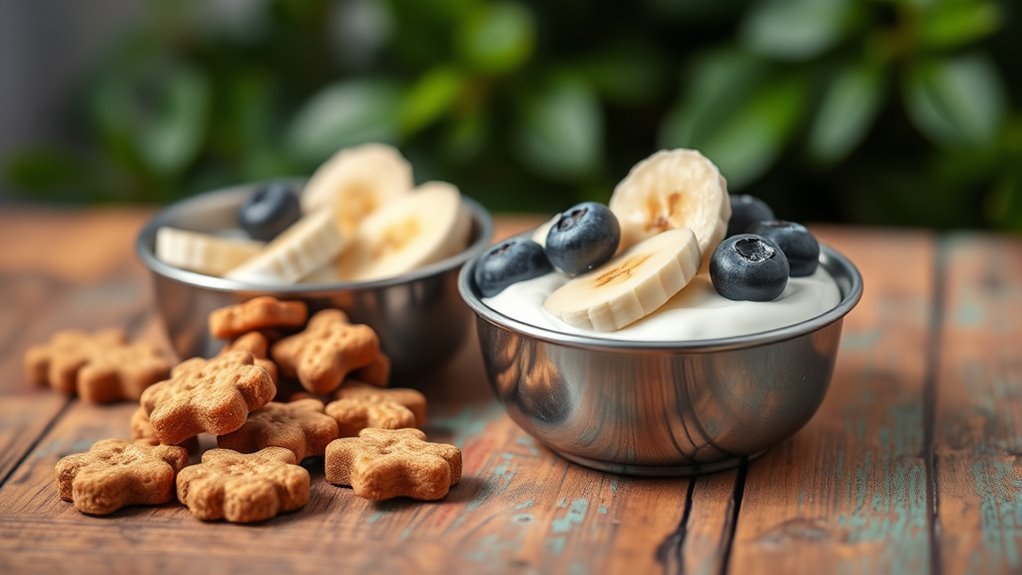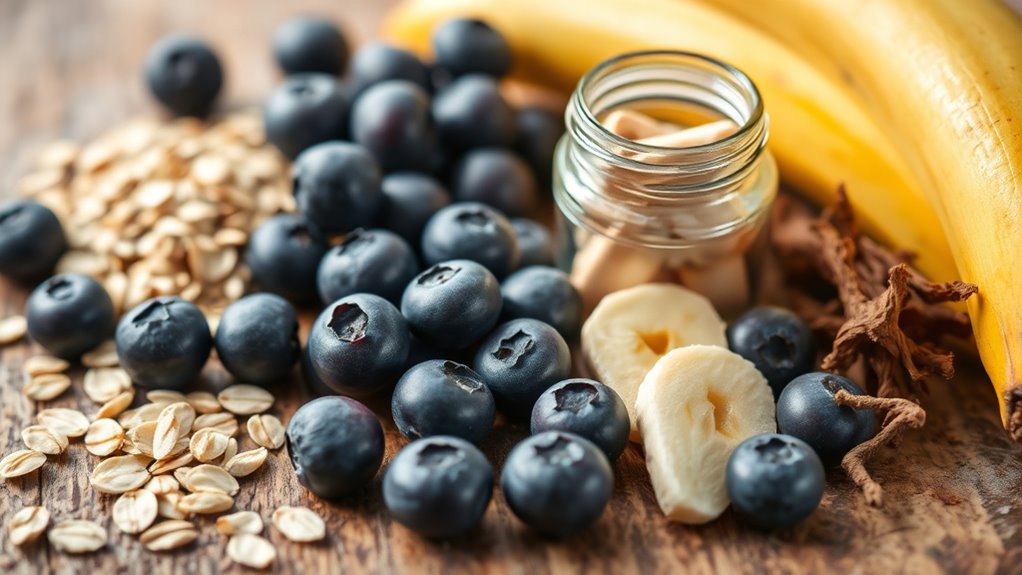Maintaining your dog’s gut health is essential for their overall well-being, and probiotics and prebiotics play a big role in that. Probiotics add beneficial bacteria directly, while prebiotics feed those good microbes, supporting fermentation and microbiome diversity. A healthy, diverse microbiome helps your dog digest better, resist pathogens, and reduce inflammation. Understanding how these work together can help you boost your dog’s resilience—keep exploring to discover more tips for ideal gut health.
Key Takeaways
- Probiotics introduce beneficial bacteria that support a healthy gut microbiome in dogs.
- Prebiotics feed these good bacteria, enhancing their growth and fermentation processes.
- Together, probiotics and prebiotics improve nutrient absorption, reduce gas, and promote digestion.
- Maintaining microbiome diversity boosts the dog’s immune response and resilience to health issues.
- Regularly supporting gut fermentation and microbiome health leads to a happier, healthier dog.

A healthy gut is fundamental for your dog’s overall well-being, affecting everything from digestion to immune function. When your dog’s digestive system operates at its best, it’s because the fermentation processes happening within their gut are balanced, supporting a thriving microbiome. These fermentation processes involve the breakdown of food by beneficial bacteria, producing nutrients and compounds that nourish your dog’s body and help maintain a diverse microbial community. Microbiome diversity is essential because it ensures your dog’s gut can respond effectively to various challenges, such as pathogens or dietary changes. A diverse microbiome acts as a protective barrier, preventing harmful bacteria from taking over and reducing inflammation.
A balanced gut supports your dog’s health by maintaining microbiome diversity and effective fermentation processes.
When you introduce probiotics and prebiotics into your dog’s diet, you’re actively supporting these fermentation processes and enhancing microbiome diversity. Probiotics are live beneficial bacteria that, when ingested, help repopulate and strengthen the gut’s microbial community. Prebiotics, on the other hand, are nondigestible fibers that serve as food for these good bacteria, encouraging their growth and activity. By doing this, you help create an environment where beneficial bacteria can thrive, outcompeting harmful microbes. This balance is indispensable because a disrupted microbiome often leads to digestive issues, allergies, or immune system weaknesses.
Adding probiotics and prebiotics to your dog’s diet isn’t complicated, but it requires understanding how they work together. Think of probiotics as the reinforcements, bringing in fresh, beneficial bacteria directly to the gut. Prebiotics act as the nourishment that fuels these bacteria, helping them establish and expand. When these elements work in tandem, they boost fermentation processes that produce short-chain fatty acids, which are essential for gut lining health and immune regulation. This synergy improves digestion, reduces gas and bloating, and can even enhance nutrient absorption. Additionally, supporting microbiome diversity through these measures can improve your dog’s resilience to health issues over time.
You should also know that maintaining microbiome diversity isn’t a one-time effort. Regularly providing your dog with probiotics and prebiotics, whether through supplements or natural sources like certain vegetables and fermented foods, helps sustain a balanced gut environment. The goal is to keep the fermentation processes active and efficient, ensuring your dog’s gut remains resilient against disruptions. In essence, supporting fermentation processes and microbiome diversity through probiotics and prebiotics is a proactive way to promote long-term gut health, making your dog happier, healthier, and more energetic.
Frequently Asked Questions
Can Probiotics Cure All Canine Digestive Issues?
Probiotics can’t cure all canine digestive issues, but they can help improve your dog’s gut health. You should consider specific probiotic strains that support digestion and be mindful of antibiotic interactions, which may diminish their effectiveness. While they can alleviate some problems, more serious issues require veterinary attention. Always consult your vet before starting probiotics to ensure you choose the right strains and avoid any adverse interactions.
Are Prebiotics Suitable for Puppies?
You’re wondering if prebiotics are suitable for puppies. Prebiotic safety is generally high, making them a good option to support your puppy’s gut health. They help nourish beneficial bacteria in the puppy gut, promoting digestion and immunity. Always check product labels and consult your vet before introducing prebiotics, especially for young puppies. Proper use guarantees your puppy’s gut develops healthy bacteria, aiding overall growth and well-being.
How Long Does It Take to See Benefits From Probiotics?
When asking how long it takes to see benefits from probiotics, keep in mind that timing expectations vary based on individual response. Some dogs notice improvements within a few days, while others may take a few weeks. Factors like the dog’s health, diet, and specific probiotic strain influence results. Be patient, monitor your dog closely, and consult your vet if you don’t see progress within a reasonable timeframe.
Can Probiotics Replace a Vet-Recommended Diet?
Ever wondered if probiotics can replace your vet-recommended diet? While probiotics and specific strains support your dog’s gut health, they shouldn’t substitute professional dietary guidelines. Probiotics enhance digestion but aren’t a complete nutritional plan. Trust your vet’s advice for the right diet, and use probiotics as a beneficial supplement. They work best when combined with a balanced diet tailored to your dog’s needs, not as a standalone replacement.
Are There Risks of Over-Supplementing With Prebiotics?
You should be cautious about over-supplementing with prebiotics because prebiotic overdose can lead to digestive imbalance in your dog. Too many prebiotics may cause symptoms like gas, diarrhea, or bloating. Always follow recommended dosages and consult your vet before adding supplements. Over-supplementation disrupts your dog’s gut harmony, so moderation is key to supporting healthy digestion without risking adverse effects.
Conclusion
By understanding how probiotics and prebiotics nurture your dog’s gut, you’re planting the seeds for a healthier, happier pup. Think of their gut as a vibrant garden—tended with care, it blooms with vigor and resilience. When you nourish it wisely, you’re not just feeding their tummy but fueling their zest for life. So, embrace these tiny allies, and watch your furry friend’s health flourish like a beautiful, thriving landscape.










